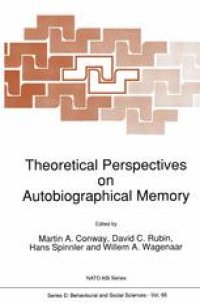
Ebook: Theoretical Perspectives on Autobiographical Memory
Author: Martin A. Conway (auth.) Martin A. Conway David C. Rubin Hans Spinnler Willem A. Wagenaar (eds.)
- Tags: Psychology general, Aging, Neurology
- Series: NATO ASI Series 65
- Year: 1992
- Publisher: Springer Netherlands
- Edition: 1
- Language: English
- pdf
The meeting Theoretical Perspectives on Autobiographical Memory was held at the Grange Hotel, Grange-over-Sands, in the Lake District region of North Western England, July 1991. The workshop was financed by a generous grant from the NATO Scientific Affairs Division under the Advanced Research Workshop programme and without this funding the meeting would not have been possible: the organisers and delegates gratefully acknowledge the support of the NATO Advanced Research Workshops programme. Thirty-five scientists from five different NATO countries attended the workshop and twenty-seven delegates presented papers. The two aims of the workshop were to bring together in one forum a number of comparatively separate approaches to autobiographical memory and to promote theory in the area generally . These aims were fulfilled in the presentations and discussions, particularly the final discussion session, in which delegates focussed on the central issues of the nature, structure, and functions of autobiographical memory and how these emerge in different research areas. The present volume contains the papers arising from the workshop. We thank Mrs. Sheila Whalley for secretarial help and Fiona Hirst and Stephen Anderson für practical assistance in coordinating registration for the workshop.
This book contains 27 state-of-the-art papers covering all aspects of autobiographical memory. In an opening section leading researchers in the field consider conceptual issues relating to the definition and appropriate characterisation of autobiographical memory. Subsequent sections deal with the social construction and development of autobiographical memory, cognitive models of autobiographical memory, and autobiographical memory across the lifespan. In the closing section impairments of autobiographical memory arising from emotional disturbances and brain damages are reviewed in some depth.
This book will be of interest to all researchers and students concerned with autobiographical memory in particular and with human memory generally. Developmental psychologists, clinicians, neuropsychologists, and gerontologists will also find the book highly relevant.